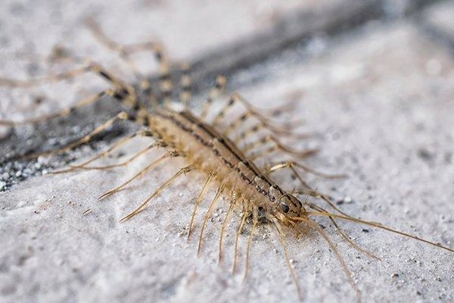If six legs aren't enough for you, and eight legs are still too few for your tastes, then I have a treat for you! Centipedes may not be a super common house pest, but they still dabble in infestations now and then. They're not actually dangerous, but they sure are creepy, and they still pack a painful bite. So what can you do if they decide to kick up their feet in your South Carolina home?
Facts About Centipedes In South Carolina
The most common centipede found in South Carolina is the house centipede. Growing up to 1 ½ inches in length, these creepy crawlies sport 15 pairs of long legs, and antennae extending almost the entire length of their bodies. They're yellowish brown with dark stripes running down their backs and banded around their legs. Their front limbs sport sharp claws at the end, filled with venom that they use to defend themselves and immobilize their prey.
Centipedes aren't insects; rather, they're myriapods, a subphylum of arthropods. Much like insects, they're multi-segmented with several pairs of legs, but the difference is they didn't stop at just three; they kept going until they amassed a delightful collection of segments and legs. The house centipede is different from other species, though, as they have much longer legs than any other. Despite how terrifying they look, they're very delicate, and if physically handled their limbs snap off like fragile twigs.
Some property owners view centipede infestations as harmless little house guests. Since their diet consists solely of other insects, and they aren't dangerous to health or property, they help to keep harmful pest problems to a minimum. This could become a problem if they choose to inhabit high-traffic areas, though. Even though house centipedes have a difficult time biting through human skin, and their venom is relatively harmless to us, it's still pretty painful to deal with.
What Attracts Centipedes Into South Carolina Homes?
There are several contributing factors to a centipede infestation. They don't leave much behind in terms of evidence of an infestation, and they're difficult to spot because they're nocturnal insects. If you do happen to spot them inside your home, though, it's probably because of:
- Excessive moisture; they prefer dark, damp environments
- Ample food source; they eat other insects, so an infestation could be a sign of another underlying pest problem
- Inclement weather; especially cold and rainy weather will push pests such as centipedes indoors
How To Prevent Centipede Infestations In Your South Carolina Home
Centipedes don't necessarily want to invade your home since they're usually pretty content with staying outside. Still, they can become pests given the right circumstances, so as long as you make sure your home isn't too hospitable it should be a breeze:
- Locate and repair any leaky pipes
- Patch up holes in the foundation and outer walls of your home
- Repair any holes and gaps around outdoor-leading pipes and wires
- Replace worn-down insulation around windows and door frames
- Invest in a dehumidifier for rooms that produce excessive moisture, such as a bathroom, kitchen, laundry room, and basement
- General pest prevention maintenance; clean food-prep areas, sweep and mop regularly, vacuum, etc.
Time To Kick Those Leggy Freeloaders To The Curb
Harmless or not, cohabiting in a living space with creepy critters is enough to make your skin crawl. If you're struggling with a centipede infestation in your South Carolina home, give the Bugman a call. Our highly-trained pest experts at The Original Bugman Pest Elimination, Inc. are perfectly prepared for infestations like centipedes, and we're willing to put our 100% satisfaction guarantee to the test for you. If we treat your home and property, and you still notice a pest problem afterward, we come right back out and re-treat at no additional cost! Get in contact with us today to start discussing your pest control options.
Schedule Your Free Inspection
Complete the form below to schedule your no-obligation inspection.

